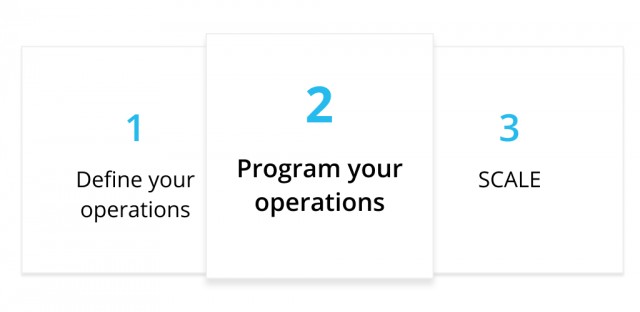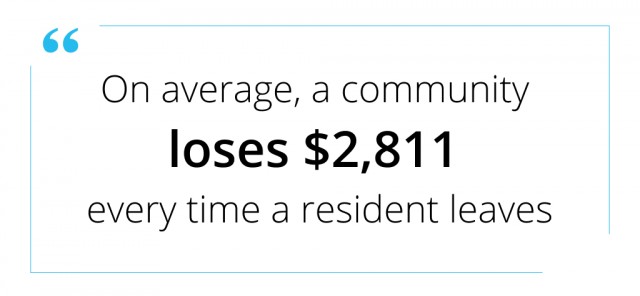Multifamily Blogs
Multifamily, We Have a Scaling Problem
Multifamily, We Have a Scaling Problem
Introduction
First off, we need to explain what ‘scaling operations’ means.
Operations are ‘scalable’ if they can use a small increase in costs to generate a large increase in growth.
Let’s break it down further.
Currently, when a property management company (PMC) gets more properties, it has to invest in more staff. This added cost of hiring new employees cuts into profits.
But, with scaled operations, that’s not the case. An employee will can create a system for how to do things and then scale it.

Imagine you have a property management company with 5 marketers managing 50 properties.
Now, what will happen if they get 50 more properties?
With the standard operating system, the company has to double the amount of marketers.
But, in a scaled operating system, the company may only need to add one more marketer.

Symptoms of an Unscaled PMC

Property management companies know they have inefficiencies in their lead-to-lease process.
We know agents don’t have the tools or resources to spend their time efficiently. Their lead follow-up is weak, systems are not consistent, and scalability is difficult to achieve.
Jake Meador, director of content strategy at Rentping, echoes our thoughts stating, “…leasing efficiency improves by improving the overall marketing and leasing system.”
Clerical Work Fills the Day
Everyone in business knows that time is money. In the Multifamily sector, time is being wasted. Every day, employees are doing the same repetitive and time-consuming tasks.
Take a look at this agent’s job description.
Yikes! That's a lot to take in.
In the short term, employees can’t get everything done. Some tasks are dropped and others are left incomplete.
In the long term, employees will become frustrated since they can’t get everything done.
Additionally, they will have little time to focus on the inspiring and energizing parts of their jobs.
This combination will decrease employee satisfaction.
Ultimately, leading to a decrease in employee productivity.
Lead Follow-up is Disappointing
According to a study done by Hyly, 45.8% of 3rd Party Managers did NOT respond to inquiring prospects.
In other words, almost half of the prospects actively reaching out to 3rd party managers are being ignored.
Competitors will convert these dropped leads into signed leases.

In the short term, fewer leases will be signed due to the lack of responsiveness.
In the long term, the company’s reputation will suffer. This will result in fewer management contracts. Which means the company making less money.
Learn more about follow-up in Multifamily.
Residents are Not Engaged
In the Multifamily industry, resident retention is often overlooked. Multifamily had a turnover rate of 54% in 2012, according to the NAA Survey of Operating Income and Expense.
Often property management companies don’t take the time to welcome, engage, or cultivate a sense of community to improve resident retention.
Companies who don’t prioritize resident retention are missing out. It is cheaper to keep residents than sign new leases.

In the short term, residents are not engaged and less likely to renew their leases.
In the long term, managers will spend more time and money to keep properties filled.
Lead Nurturing is Rare
Nurturing responses inform, educate, or excite prospects about the property.
Nurturing prospects is a key step in getting leases signed.
Why? Because people are more likely to sign with an agent they know and trust.
But, agents don’t always have time to carefully craft nurturing responses for each lead. Causing agents to miss an opportunity to build relationships with the leads.
The survey by Hy.ly showed only 12.5% of 3rd party managed properties respond with nurturing emails. Meaning, 87.5% of responses did not engage or educate the prospect.

In the short term, leads will be less engaged, less informed, and less likely to sign a lease.
In the long-term, the company will have a lower signing rate and a lower profit margin for owners. Resulting in fewer management contracts and lower revenues.
Clearly, property management companies don’t have the resources necessary to thrive.
Diagnosis: Multifamily Not Structured to Scale
We have talked about some of the resource problems in the Multifamily. Plus, we learned that scaling operations reduces the amount of capital needed for growth.
So why isn’t Multifamily scaling operations?

Long training cycles and inconsistency make scaling impossible.
Let’s dig a little deeper.
Consistency is a Dream
Relationship building is the foundation of the Multifamily industry. Agents use different styles to grow relationships based on their experiences and personality.
The style differences between agents is what makes the multifamily industry unique.
However, it lends itself to inconsistency.
One example? Lead follow-up.
Experienced agents have refined the cadence of reaching out to leads, but new agents often have not honed their outreach skills.
Some worry about annoying leads and don’t reach out enough. While others may be aggressive and bombard leads with emails.
This leaves the leads unsatisfied, unlikely to refer a friend, and unclear about the company’s values.
In the short-term, agents will have ineffective lead engagement and leave each prospect with a different customer experience. Leading to fewer leases signed and lower resident retention.
In the long-term, they will be less attractive to owners. Also, the company will spend more time and money on lead generation. This inconsistency will increase costs and decrease NOI.
Training Cycles are Long
Across all industries, new employees average six months before they are fully trained.
Now, let's add in Multifamily's lack of consistency into the mix.
The lack of consistency means it takes longer to train each employee because everyone has their own method of getting the job done. This means, your staff has to work harder to do the job. So, more things are going to fall through the cracks or you need to hire more staff.
However, look at a company that has mastered scaling, like McDonald's. On-boarding a line cook with no experience can be trained in only three days!
Decreasing training cycles is a big deal considering property management companies experience a turnover of 54% of leasing agents every year.

In the short term, new employees won’t be using the best practices for their first six months.
That’s huge, especially if 50% of their staff is new every 12 months!
In the long term, many employees will not use optimal operations. This will result in fewer signed leases, fewer property management contracts, and hurt the bottom line.
Scaling is a Struggle
Operational inconsistency, long training cycles and inadequate resources make scaling operations impossible.

Companies need clear, consistent, repeatable systems in place to scale their operations.
Treatment Options: Coming Soon
Next on our Scaling Multifamily series, we will be talking about the treatment options for Multifamily's Scaling Epidemic.
Your turn. What are some other barriers to scaling operations for Multifamily?


